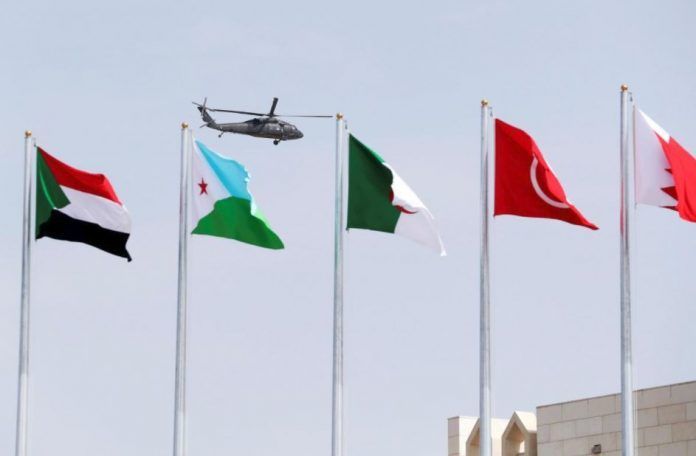
By Stephen Kalin and Sarah Dadouch
RIYADH, May 9 (Reuters) – Saudi Arabia and its Gulf allies basked in what they saw as a political victory over Iran, their rival for regional influence, after Washington withdrew from the international nuclear accord with Tehran.
Saudi Arabia, the United Arab Emirates and Bahrain swiftly backed U.S. President Donald Trump’s decision to reimpose sanctions on Tehran, reflecting their concern about Iran’s ballistic missile programme and support for militant groups.
“Paris and London may not like Trump’s decision, but how would the French or British feel if their capital cities came under direct threat by the Iranians?” Faisal Abbas wrote in Saudi Arabia’s English-language Arab News daily next to a headline that read: “The deal is dead.”
Ziad, a Saudi businessman, said the kingdom’s leadership was correct to question the 2015 nuclear accord which had eased sanctions in exchange for Tehran limiting its nuclear program to prevent it from being able to make an atomic bomb.
“Every couple of days we have missiles coming from Yemen and we see evidence that they are made by Iran…it is interfering in Syria, Yemen, Morocco. Other countries may accept that but here in Saudi Arabia we don’t accept that,” he said.
Sunni Muslim Saudi Arabia has been at loggerheads with Shi’ite Iran for decades, fighting a long-running proxy war in the Middle East and beyond, including conflicts in Iraq, Syria, Lebanon and Yemen. Iran denies accusations against it.
The Saudi foreign ministry accused Iran of using economic gains from the lifting of sanctions to develop ballistic missiles and support militant groups.
It called for a “comprehensive view that is not limited to its nuclear programme but also includes all hostile activities”.
Anwar Gargash, UAE Minister of State for Foreign Affairs, wrote on Twitter: “Iran interpreted the JCPOA as concurrence of its regional hegemony. An aggressive Iran was emboldened as a result & its ballistic missile program became both offensive & exportable.”
Trump, echoing Riyadh and Abu Dhabi’s stance, has criticised the accord, known by its acronym JCPOA, because it does not address Iran’s ballistic missile program, its nuclear activities beyond 2025, or its role in regional wars.
GULF PRAGMATISM
Other Gulf states such as Oman, which orchesterated secret U.S.-Iran contacts that helped pave the way for the 2015 nuclear deal, have not officially commented yet on Trump’s decision.
Qatar, which is in locked in a dispute with Saudi Arabia and other Arab states, has yet to issue a statement. Saudi Arabia, the UAE, Bahrain and Egypt imposed a trade and transport boycott against Qatar in June, accusing Doha of financing militant groups and cozying up to Iran. Qatar denies the accusations.
“The Omani, Qatari, and Kuwaiti governments have all sought to maintain pragmatic relations — economic more than political — with Iran,” said Kristian Coates Ulrichsen, Fellow for the Middle East at Rice University’s Baker Institute.
“There is likely to be a feeling of jubilation in Riyadh and Abu Dhabi that the Trump administration – or at least the White House – has now come round to their thinking on Iran’s threat to regional security.”
In his White House speech, Trump condemned Iran’s “sinister activities” including backing for groups like Hezbollah, Hamas, the Taliban and al-Qaeda – charges Tehran has denied.
Abdulaziz al-Sager, head of the Jeddah-based Gulf Research Centre, said the message was significant in that it reflected Gulf Arab concerns.
“We’ve always said our concern about this agreement in 2015 was that Iran should not take it as carte blanche to go and expand its territorial influence,” he said.

Prince Mohammed, who serves as Saudi defence minister, told CBS News in March that his country would “without a doubt” develop nuclear weapons if Iran did so.
Iran has ruled out renegotiating the accord and threatened to retaliate, although it has not said exactly how, if Washington pulled out.
It may do so by undermining the interests of Washington and its allies in the Middle East including by increasing support for Yemen’s Houthi armed movement, possibly provoking a military response from Saudi Arabia and the United Arab Emirates.
“There is a real risk of escalation, especially between Iran and Israel. While the Gulf states may want to see the U.S. and Israel try to cut Iran to size, I don’t think they want to get dragged into a direct confrontation themselves. The consequences could be severe,” said Joost Hiltermann, Program Director, Middle East and North Africa at The International Crisis Group.
Iman Taher, a Yemeni teacher in Aden, said he feared Trump’s decision will only inflame conflicts in the region.
“Iran will not accept and it will respond and increase its support for the Houthis in Yemen and its allies in Syria and Lebanon.”
(Additional reporting by Marwa Rashad in Riyadh, Mohammed Ghobari in Aden; Editing by Ghaida Ghantous and Angus MacSwan)

